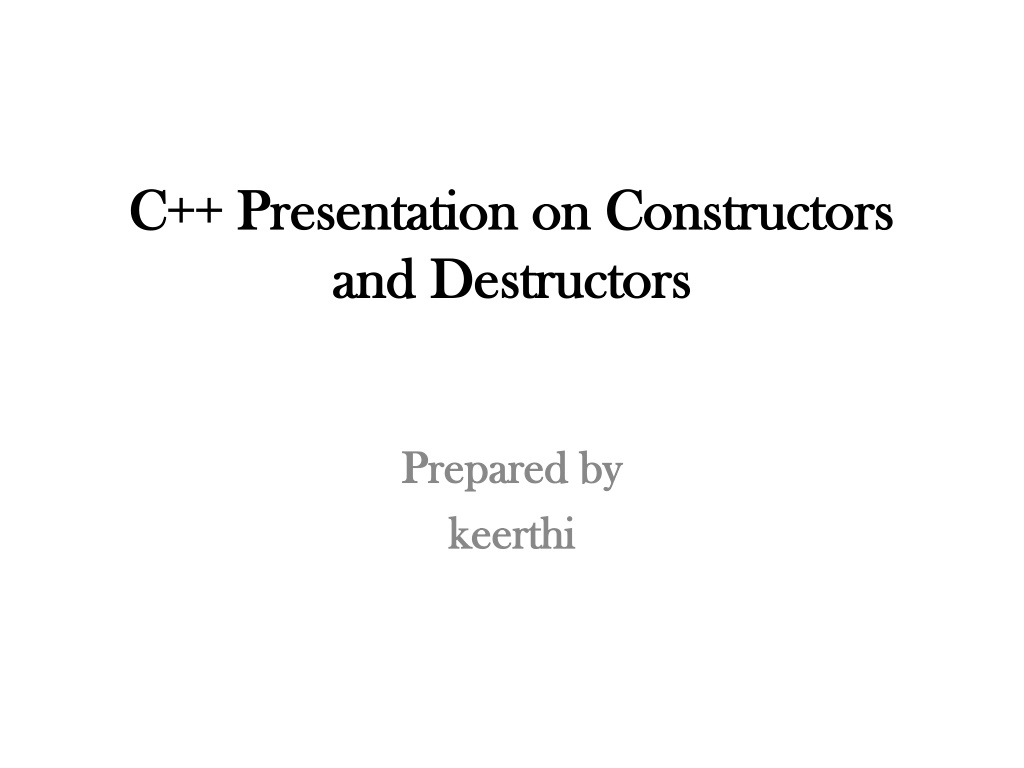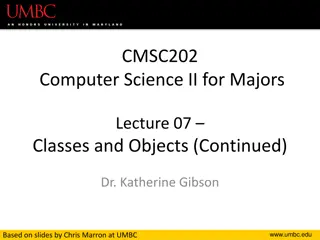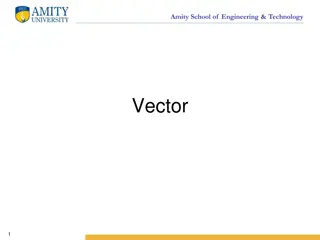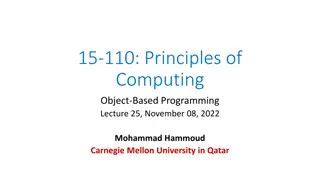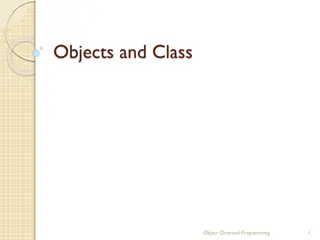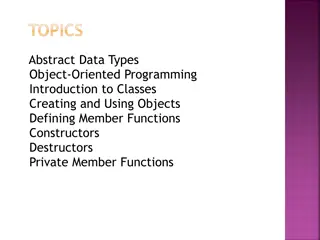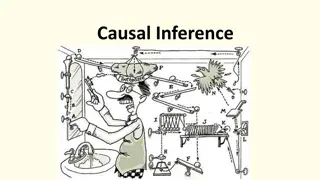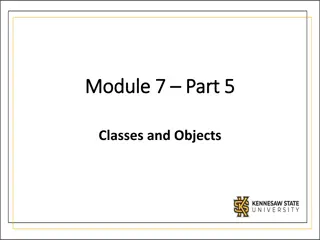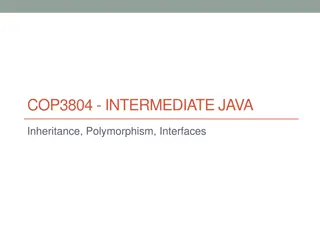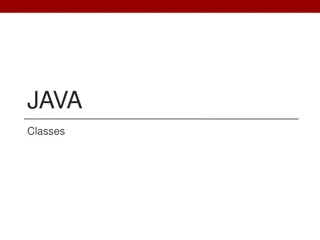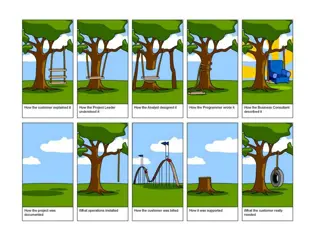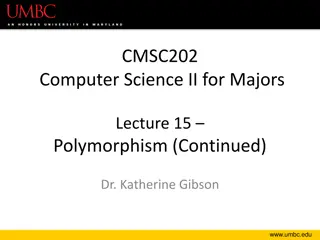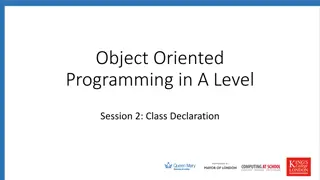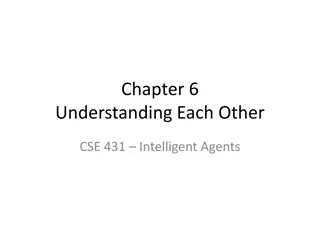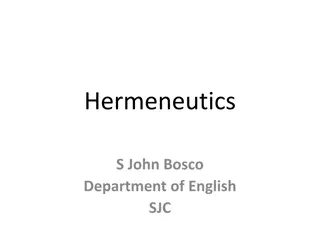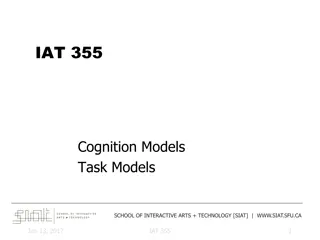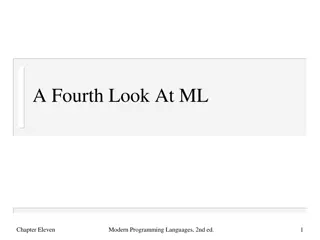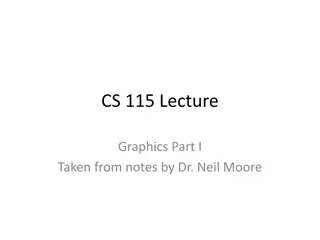Understanding Constructors and Destructors in C++
Constructors in C++ are special member functions that initialize objects of a class. They are automatically called when an object is created and have the same name as the class. Constructors differ from normal functions as they do not have a return type and are automatically invoked upon object instantiation. This presentation explains different types of constructors, such as default and parameterized constructors, along with their usage and examples.
Download Presentation

Please find below an Image/Link to download the presentation.
The content on the website is provided AS IS for your information and personal use only. It may not be sold, licensed, or shared on other websites without obtaining consent from the author. Download presentation by click this link. If you encounter any issues during the download, it is possible that the publisher has removed the file from their server.
E N D
Presentation Transcript
C++ Presentation on Constructors C++ Presentation on Constructors and Destructors and Destructors Prepared by Prepared by keerthi keerthi
Constructors in C++ Constructors in C++ What is constructor? What is constructor? A constructor is a member function of a class which initializes objects of a class. In C++, Constructor is automatically called when object(instance of class) create. It is special member function of the class. How constructors are different from a normal member How constructors are different from a normal member function? function? A constructor is different from normal functions in following ways: Constructor has same name as the class itself Constructors don t have return type A constructor is automatically called when an object is created. If we do not specify a constructor, C++ compiler generates a default constructor for us (expects no parameters and has an empty body).
Types of Constructors Types of Constructors Default Constructors: Default Constructors: Default constructor is the constructor which doesn t take any argument. It has no parameters. Cpp program to illustrate the concept of Constructors #include <iostream> using namespace std; class construct { public: int a, b;
// Default Constructor construct() { a = 10; b = 20; } }; int main() { // Default constructor called automatically // when the object is created construct c; cout << "a: " << c.a << endl << "b: " << c.b; return 1; } Output: a: 10 b: 20
Parameterized Constructors: Parameterized Constructors: It is possible to pass arguments to constructors. Typically, these arguments help initialize an object when it is created. To create a parameterized constructor, simply add parameters to it the way you would to any other function. When you define the constructor s body, use the parameters to initialize the object. CPP program to illustrate parameterized constructors #include <iostream> using namespace std; class Point
{ private: Int x, y; public: // Parameterized Constructor Point(int x1, int y1) { x = x1; y = y1; } int getX() { return x; } int getY() { return y; } };
int main() { // Constructor called Point p1(10, 15); // Access values assigned by constructor cout << "p1.x = " << p1.getX() << ", p1.y = " << p1.getY(); return 0; } Output: p1.x = 10, p1.y = 15
Uses of Parameterized constructor: Uses of Parameterized constructor: It is used to initialize the various data elements of different objects with different values when they are created. It is used to overload constructors. Can we have more than one constructors in a class? Can we have more than one constructors in a class? Yes, It is called Constructor Overloading. Copy Constructor: Copy Constructor: A copy constructor is a member function which initializes an object using another object of the same class. Detailed article on Copy Constructor.
What is destructor? What is destructor? Destructor is a member function which destructs or deletes an object. When is destructor called? When is destructor called? A destructor function is called automatically when the object goes out of scope: (1) the function ends (2) the program ends (3) a block containing local variables ends (4) a delete operator is called How destructors are different from a normal member How destructors are different from a normal member function? function? Destructors have same name as the class preceded by a tilde (~) Destructors don t take any argument and don t return anything
class String { private: char *s; int size; public: String(char *); // constructor ~String(); }; String::String(char *c) { size = strlen(c); s = new char[size+1]; strcpy(s,c); } // destructor
String::~String() { delete []s; } Can there be more than one destructor in a class? Can there be more than one destructor in a class? No, there can only one destructor in a class with class name preceded by ~, no parameters and no return type. When do we need to write a user When do we need to write a user- -defined destructor? If we do not write our own destructor in class, compiler creates a default destructor for us. The default destructor works fine unless we have dynamically allocated memory or pointer in class. When a class contains a pointer to memory allocated in class, we should write a destructor to release memory before the class instance is destroyed. This must be done to avoid memory leak. Can a destructor be virtual? Can a destructor be virtual? Yes, In fact, it is always a good idea to make destructors virtual in base class when we have a virtual function. See virtual destructor for more details. defined destructor?
